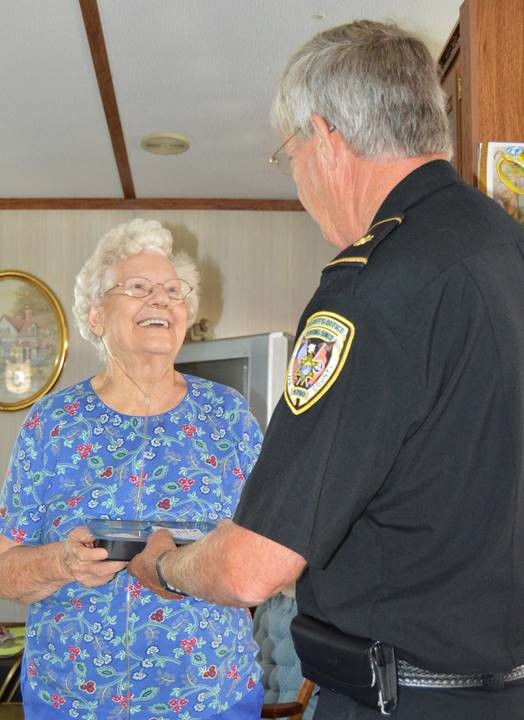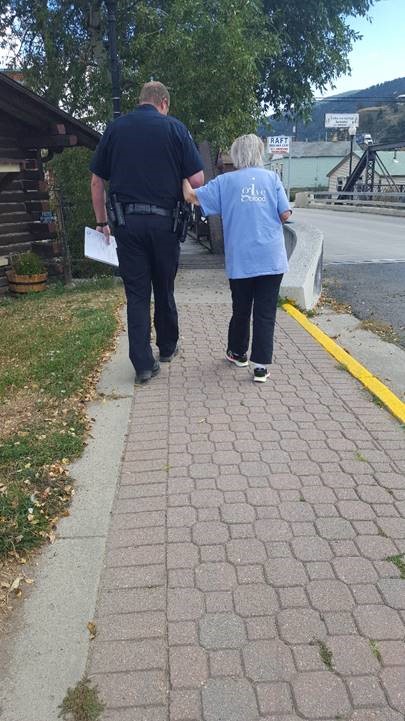Contact Us
To provide feedback on the Community Policing Dispatch, e-mail the editorial board at CPDispatch@usdoj.gov.
To obtain details on COPS Office programs, publications, and resources, contact the COPS Office Response Center at 800-421-6770 or AskCopsRC@usdoj.gov

U.S. Department of Justice
Office of Community Oriented Policing Services
Washington, DC 20530
 Who would steal the life savings of sweet old ladies or kindly old gentlemen, leaving them destitute, even homeless? Actually, a surprising number of people would. And, they would most likely be individuals trusted by the victim—family members, caregivers, or new “friends.” In fact, the most common form of elder abuse is financial exploitation perpetrated through deception, manipulation, or coercion by individuals known to the victim.
Who would steal the life savings of sweet old ladies or kindly old gentlemen, leaving them destitute, even homeless? Actually, a surprising number of people would. And, they would most likely be individuals trusted by the victim—family members, caregivers, or new “friends.” In fact, the most common form of elder abuse is financial exploitation perpetrated through deception, manipulation, or coercion by individuals known to the victim.
It’s widely acknowledged to be a growing problem, booming right along with the growth of the generation that bears a similar name. According to Kathleen Quinn, past director of the National Adult Protective Services Association, financial abuse has become rampant. But, despite estimates that the financial costs amount to billions of dollars a year, these crimes are seldom reported to law enforcement.
An Insidious Crime, Difficult to Prosecute
Even when the cases are reported by concerned individuals, nursing homes, or Adult Protective Services (APS), prosecuting a criminal case can be difficult. Seniors are often poor witnesses: many suffer from memory lapses or cognitive disabilities. Others are too embarrassed to admit they were hoodwinked, or reluctant to believe that somebody they depended upon would hurt them.
What sets financial abuse cases apart from fraud and financial scams is that these crimes are perpetrated by individuals who use their personal relationships to gain control of the victim’s property or assets through power of attorney, joint tenancy on bank accounts, and other means.
But, as unethical as these activities can be, they may not appear to be illegal. In fact, financial abuse often occurs with the unwitting or fearful consent of the victim. For this reason, a law enforcement officer might initially believe it to be a civil case.
However, even if the individual agreed to the activity that stripped them of their assets, he or she was likely to have been cognitively impaired, confused, or threatened. Simply asking a few questions may reveal criminal intent on the part of the suspected perpetrator. If, for instance, power of attorney was used, what did the victim believe when granting it, how did he or she feel at the time, and in what way has the power of attorney been used to benefit the older person?
Cover All Bases through a Multidisciplinary Team Approach
Collaboration from Unlikely Sources Solved the Case
Mr. and Mrs. J, an elderly couple with over $1 million in assets, employed a female homecare worker through a home healthcare agency. After the husband died, the worker won Mrs. J’s confidence and gained access to the elderly woman’s assets by taking her to a lawyer who granted power of attorney to the worker on the pretext that the widow was not capable of managing her money.
Soon afterward, Mrs. J was admitted to the local hospital’s ER. Concerned because this was the third time she’d been hospitalized in six months, the attending physician ran a toxicology screen which revealed that drugs in her system were not only inappropriate, but could kill her. The doctor called Adult Protective Services (APS), who called police to initiate a criminal investigation.
In the meantime, the worker took hundreds of thousands of dollars out of Mrs. J’s account and gambled away over $500,000 of it. But, casinos track high rollers, and this one reported “something fishy” to the police.
Though Mrs. J did not recover all of her funds, the looting of her account stopped and the worker was convicted of financial abuse. As in most cases that are resolved successfully, it was the help of many organizations and individuals that made the difference. Law enforcement could not have saved this victim from financial ruin without their intervention and support.
In order to establish a criminal case, law enforcement must prove that the funds were misappropriated through deception or undue pressure. According to Randy Thomas, retired lead instructor for training in elder and child abuse cases at the South Carolina Department of Public Safety Criminal Justice Academy, the most effective way to investigate such a case is through a multidisciplinary approach. He advises teaming up with prosecutors and APS (or similar organizations), as well as with banks, attorneys who specialize in guardianship and elder law, the medical community, and even state tax departments. Another source of support, he suggests, is the child abuse units in law enforcement agencies, which can provide advice on forensic interviewing and investigative techniques.
Detective Adam Gibson, a specialist in elder abuse with the Quincy (IL) Police Department, maintains that involving APS is essential in many cases, especially if a new caregiver or method to pay bills must be found, or if housing and other services need to be provided.
Like Thomas, Gibson believes that collaboration is key to resolving financial abuse problems, and he is part of a multidisciplinary teamthat deals with both elderly and disabled adult cases. This group, which includes doctors, lawyers, mental health experts, APS representatives, and drug abuse experts, meets monthly to brainstorm troubling cases. Gibson finds their insights particularly helpful when the exploitation is the result of the perpetrator’s mental health problems, drug addiction, or alcohol abuse.
Start with Social Services, Then Follow the Money
If a reported case of financial exploitation doesn’t initially seem to meet criminal standards, Thomas and Gibson recommend starting the fact-gathering process by contacting social services providers. They have the skills, resources, and contacts critical to establishing probable cause. APS can get financial and medical records and sometimes provide legal services as well.
The next step is to follow the money by contacting the security or fraud units of the victim’s and the suspect’s banks. However, policies for allowing police officers to search bank records differ among states, with some requiring that a search warrant or subpoena be acquired from a state’s attorney, a grand jury, or a prosecutor.
Build Relationships with Prosecutors, Lawyers, and Accountants
Thomas suggests building a relationship with a prosecutor at the outset to determine if the case is prosecutable and teaming up with a lawyer who specializes in power of attorney, trusts, and other relevant aspects of the law. Attorneys hired to acquire guardianship or pursue civil cases against the suspects can be helpful too.
Another source of support are the Medicaid Fraud Control Units in each state. Though any accountant can be helpful, these units may be able to provide forensic accountancy expertise. State and local tax departments can be of assistance too: perpetrators seldom pay tax on their ill-gotten gains. And, the collaboration of state law enforcement agencies may be essential if the local jurisdiction lacks sufficient expertise, or if essential records are in a different county.
Older Victims Require Special Handling
Concerned neighbors, local merchants, and other members of the community may be good sources of evidence, as would the staff of an older person’s nursing home. But, the testimony of the victim is of primary importance.
Detective Thomas advises that officers take time to establish trust and develop rapport, adding that the victims’ reluctance to speak ill of a relative or friend may make it difficult for them to talk openly. Detective Gibson says “The first time I interview victims, I don’t say that somebody is misusing their money, but just try to find out if they know where it is going and who is managing it. I need to know if they are fully aware of what is going on, to determine if it is a criminal or civil case.”
“I never argue with the interviewee,” he adds, “and I never accuse the perpetrator since that individual may be a family member. In fact, I insist that the caregiver be out of the room, and, if I believe that the individual is an abuser, I try to get the case solved as fast as possible to ensure that the caregiver does not harm the victim.”
 Get Involved to Curb the Abuse
Get Involved to Curb the Abuse
Once the case is closed, police can follow up by enforcing restraining orders, performing well-being checks of vulnerable persons, and supervising the conduct of perpetrators. Even if the case has not been prosecuted, both Detective Gibson and Adams often put the suspects on notice that they are being watched and warn that their unethical activities must stop.
Officers also perform a valuable service by supporting other professionals in their efforts to detect and intervene in such cases. Detective Thomas says, “This is not so much about arresting people as it is about providing a needed service, with police working in a social service role with APS and other organizations or individuals.”
Most importantly, law enforcement agencies and police academies can include financial abuse and the special needs of elderly persons in their training curricula. Advocating for policies and programs such as specialized police units and the use of videotaped testimony for victims who are unable to come to court would also go a long way toward combatting this growing area of criminal activity.
Ongoing Vigilance is Critical
If it takes a village to raise a child, it also takes a village to protect a vulnerable senior. Though the initial reports are often made to APS by nursing homes, the alarm can be raised by hospital personnel who recognize that a senior is not getting enough to eat, an accountant from the local utility company whose bills are not paid, or a grocery store cashier who sees an elderly person shopping with a companion who mistreats them and demands that they buy inappropriate items. Every one of these concerned individuals can provide needed testimony or insights.
In all cases, law enforcement must work hand in hand with others to detect criminal intent, investigate, and solve the problem. Above all, police must encourage the good will and support of the community at large, who can be the eyes and ears of local law enforcement. Detection and early intervention are critical to curbing this devastating, yet often invisible, crime.
Faye C. Elkins
Senior Technical Writer (COPS)
RESOURCES:
The National Adult Protective Services Association
http://www.napsa-now.org/get-informed/what-is-financial-exploitation/
The Elder Justice Initiative of the U.S Department of Justice
https://www.justice.gov/elderjustice/law-enforcement-1
The American Bar Association Commission on Law and Aging
https://www.americanbar.org/groups/law_aging.html
National Center on Elder Abuse
https://ncea.acl.gov/
Subscribe to Email Updates
To sign up for monthly updates or to access your subscriber preferences, please enter your email address in the Subscribe box.






